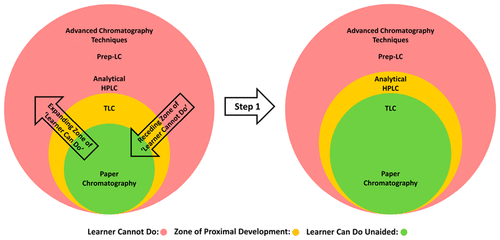当前位置:
X-MOL 学术
›
J. Chem. Educ.
›
论文详情
Our official English website, www.x-mol.net, welcomes your feedback! (Note: you will need to create a separate account there.)
Accelerating Students’ Learning of Chromatography with an Experiential Module on Process Development and Scaleup
Journal of Chemical Education ( IF 3 ) Pub Date : 2020-03-04 , DOI: 10.1021/acs.jchemed.9b01076 Mingrou Xie 1 , Pavan Inguva 1, 2 , Wenqian Chen 1 , Nicholaus Prasetya 1 , Andrew Macey 1 , Peter DiMaggio 1 , Umang Shah 1 , Clemens Brechtelsbauer 1
Journal of Chemical Education ( IF 3 ) Pub Date : 2020-03-04 , DOI: 10.1021/acs.jchemed.9b01076 Mingrou Xie 1 , Pavan Inguva 1, 2 , Wenqian Chen 1 , Nicholaus Prasetya 1 , Andrew Macey 1 , Peter DiMaggio 1 , Umang Shah 1 , Clemens Brechtelsbauer 1
Affiliation

|
The objective of the presented module is to train students with no background in process development and scaleup of chromatographic processes to a high level of competency within 40 contact hours. The key pedagogical approach is “progression” where students’ capabilities are gradually built up with appropriate scaffolding provided at each stage of their learning. The module is broken up into three steps, with each step covering a different aspect of chromatography. Knowledge gained in one step is the foundation for work in the next. In the first step, students investigate several chromatographic column packing materials and perform a solvent selection process. Design of experiment (DOE) to systematically vary process parameters for method development is introduced in the second step. In the last step, students use a preparative-LC system to perform a larger-scale separation. Students explore different scale-up scenarios, including volume fraction collection and column overloading. Pedagogic outcomes of the module were determined through surveys, interviews, and personal interaction during the study. Results clearly indicate that students engaged well with the module while meeting overall learning objectives. The module is equally suitable for third- or fourth-year university students or industry practitioners unfamiliar with chromatography as part of continuing professional development.
中文翻译:

使用过程开发和规模化经验模块,促进学生学习色谱
所介绍模块的目的是在40个接触小时内培训没有背景的学生进行色谱开发和层析工艺的扩展,使其具有较高的能力。关键的教学方法是“进步”,即在学习的每个阶段都通过适当的支架逐步培养学生的能力。该模块分为三个步骤,每个步骤涵盖色谱的不同方面。一步获得的知识是下一步工作的基础。第一步,学生研究几种色谱柱填充材料并执行溶剂选择过程。第二步介绍了实验设计(DOE),以系统地改变过程参数以进行方法开发。在最后一步,学生使用制备型液相色谱系统进行大规模分离。学生将探索不同的放大方案,包括体积分数收集和色谱柱超载。该模块的教学效果是通过调查,访谈和研究过程中的个人互动来确定的。结果清楚地表明,学生在达到总体学习目标的同时,与模块的互动良好。该模块同样适用于三年或四年级的大学生或不熟悉色谱法的行业从业人员,这是持续专业发展的一部分。结果清楚地表明,学生在达到总体学习目标的同时,与模块的互动很好。该模块同样适合三年或四年级的大学生或不熟悉色谱法(作为持续专业发展的一部分)的行业从业人员。结果清楚地表明,学生在达到总体学习目标的同时,与模块的互动良好。该模块同样适用于三年或四年级的大学生或不熟悉色谱法的行业从业人员,这是持续专业发展的一部分。
更新日期:2020-04-24
中文翻译:

使用过程开发和规模化经验模块,促进学生学习色谱
所介绍模块的目的是在40个接触小时内培训没有背景的学生进行色谱开发和层析工艺的扩展,使其具有较高的能力。关键的教学方法是“进步”,即在学习的每个阶段都通过适当的支架逐步培养学生的能力。该模块分为三个步骤,每个步骤涵盖色谱的不同方面。一步获得的知识是下一步工作的基础。第一步,学生研究几种色谱柱填充材料并执行溶剂选择过程。第二步介绍了实验设计(DOE),以系统地改变过程参数以进行方法开发。在最后一步,学生使用制备型液相色谱系统进行大规模分离。学生将探索不同的放大方案,包括体积分数收集和色谱柱超载。该模块的教学效果是通过调查,访谈和研究过程中的个人互动来确定的。结果清楚地表明,学生在达到总体学习目标的同时,与模块的互动良好。该模块同样适用于三年或四年级的大学生或不熟悉色谱法的行业从业人员,这是持续专业发展的一部分。结果清楚地表明,学生在达到总体学习目标的同时,与模块的互动很好。该模块同样适合三年或四年级的大学生或不熟悉色谱法(作为持续专业发展的一部分)的行业从业人员。结果清楚地表明,学生在达到总体学习目标的同时,与模块的互动良好。该模块同样适用于三年或四年级的大学生或不熟悉色谱法的行业从业人员,这是持续专业发展的一部分。


























 京公网安备 11010802027423号
京公网安备 11010802027423号